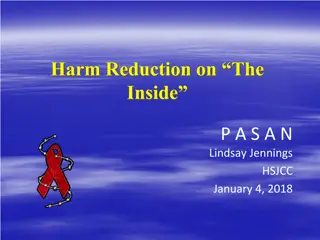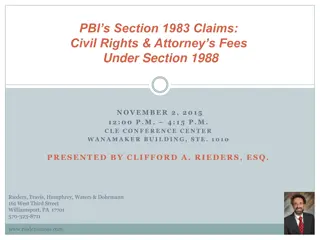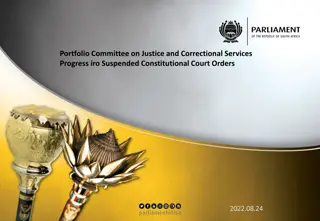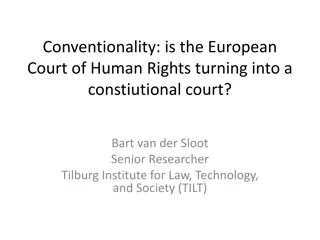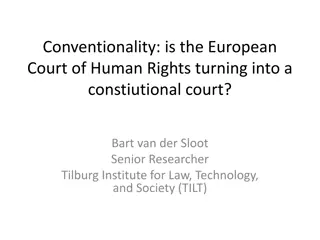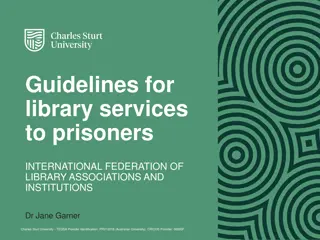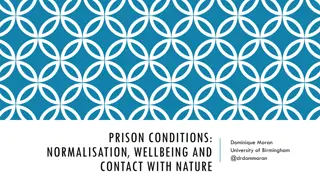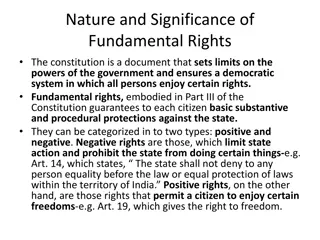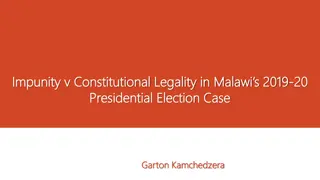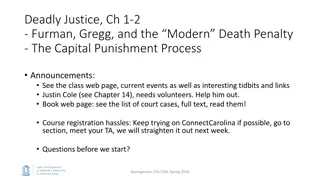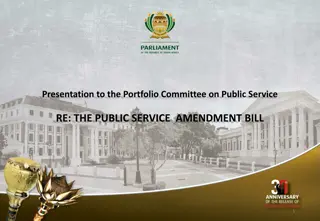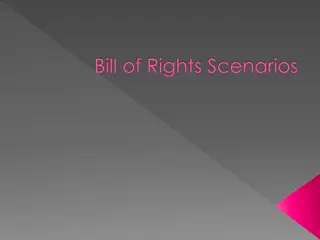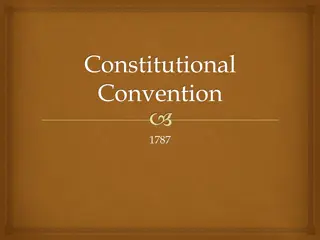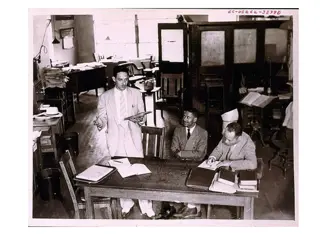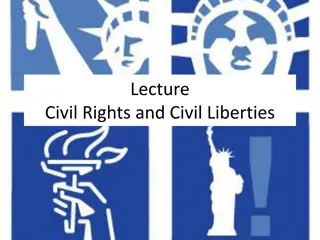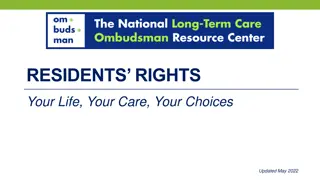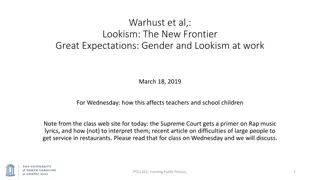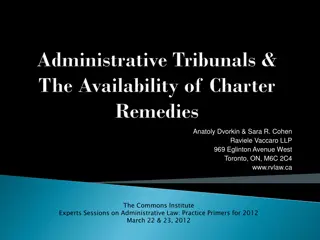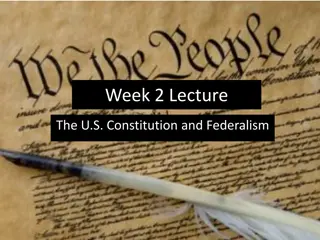Protecting the Constitutional Rights of Prisoners
Federal and state laws protect prisoners' rights, including the prohibition of cruel and unusual punishment under the Eighth Amendment. Inmates are entitled to minimum living standards, due process, and protection against discrimination. Court cases like Coleman v. Brown highlight the importance of ensuring adequate mental health care for prisoners. Brown v. Plata underscores the need for population limits to address constitutional violations in prisons.
Download Presentation

Please find below an Image/Link to download the presentation.
The content on the website is provided AS IS for your information and personal use only. It may not be sold, licensed, or shared on other websites without obtaining consent from the author. Download presentation by click this link. If you encounter any issues during the download, it is possible that the publisher has removed the file from their server.
E N D
Presentation Transcript
Constitutionality of Prisoners. Are prisoners really protected by the constitution? Kaylie Brown
Background The federal and state laws govern the establishment and administration of prisons as well as the rights of the inmates. Although they are protected by the Eighth Amendment's prohibition against cruel and unusual punishment. This protection also requires that prisoners be afforded a minimum standard of living. Process is in their right to administrative appeals and a right of access to the parole process. Additionally, the Equal Protection Clause of the Fourteenth Amendment applies to prison inmates, protecting them against unequal treatment on the basis of race, sex, and creed, and the Model Sentencing and Corrections Act, provides that a confined person has a protected interest in freedom from discrimination on the basis of race, religion, national origin, or sex. Prisoners also have rights to speech and religion, to the extent these rights do not interfere with their status as inmates.
Classification Classification describes the custodial classification of a prisoner once he is convicted, for example maximum vs. minimum security, solitary confinement, etc. Courts are extremely reluctant to limit the discretion of state prison officials to classify prisoners. Federal prison officials have full discretion to control prisoner classification as affecting conditions of confinement, granted by Congress. Federal classifications is generally controlled by the Federal Bureau of Prisoners.
Inmate rights The right to humane facilities and conditions to be free from sexual crimes to be free from racial segregation to express condition complaints to assert their rights under the Americans with Disabilities Act to medical care and attention as needed to appropriate mental health care to a hearing if they are to be moved to a mental health facility
Coleman v. Brown Was originally called Coleman v. Wilson, a federal court in Sacramento, California ruled that the CDCR is not providing adequate mental health care. What the court found in 1995 was that seriously mentally ill prisoners were being treated with punitive measures, placed in segregation without evaluation of their mental health condition and subjected to force without penological justification. A California federal district court found an existing constitutional violation with respect to use of force on seriously mentally ill inmates in a long-running class-action lawsuit. After viewing six videos of what officials with the California Department of Corrections and Rehabilitation (CDCR) described as acceptable use of force tactics, the court stopped the viewing and called the videos horrific.
Brown v. Plata The Supreme Court of the United States decided holding that a court-mandated population limit was necessary to remedy a violation of prisoners Eighth Amendment constitutional rights. California s prisons are designed to house a population just under 80,000, but at the time of the decision under review the population was almost double that. The resulting conditions are the subject of two federal class actions. This being a companion case to Coleman v. Brown which happened 12 years before reported that the state of mental health care in California s prisons was deteriorating due to increased overcrowding.
Farmer v. Brennan Dee Farmer, a biological male, underwent estrogen therapy, received silicone breast implants and underwent unsuccessful sex reassignment surgery. Farmer was convicted and sentenced to prison on federal criminal charges. Prison medical personnel diagnosed Farmer as a transsexual. Farmer was generally kept separate from the general male population, in part because of Farmer s misconduct, but also because of safety concerns. Farmer was transferred to the U.S. Penitentiary Terre Haute and placed in the general male population in accordance with prison policy. Within two weeks, a cellmate allegedly beat and raped Farmer. Farmer sued in federal district court, alleging that prison officials deliberately and indifferently failed to protect a prisoner. This violated Farmer s protection against cruel and unusual punishment under the Eighth Amendment.
Restrictions In the first amendment rights for prisoners, there are many restrictions on books, magazines, etc. and a growing trend in jails is to restrict mail to postcards only, with no letters, magazines or books allowed. In a suit filed by PLN against the Berkeley County jail in South Carolina, the only books prisoners could have were Bibles. Texas has a banned book list that contains over 12,000 titles including works by John Grisham, Shakespeare, Stephen King, George Orwell and Gore Vidal. PLN filed sued over the Texas prison system s ban on several books that we distribute, lost at the district court level, then lost before the Fifth Circuit. PLN s successful suit against a postcard-only mail policy at the Columbia County jail in Oregon was the first ruling on the merits on that issue, in 2013.
Search and Seizure Along with the fourth amendment in Hudson v. Palmer (1984), the Supreme Court held that prisoners don t have a reasonable expectation of privacy in their cells, so they can be searched at will. They can be strip searched when going to and from visits. They are subject to random drug tests and random pat-down searches. For high-security prisoners, strip searches are conducted when they leave their cell.
In hearings Although for the fifth amendment, double jeopardy does not apply to prison disciplinary hearings and criminal prosecutions; prisoners can face criminal charges and institutional discipline for the same conduct. While prisoners can maintain their right against self incrimination at parole hearings, that s likely to result in denial of parole when parole officials ask about details related to their crimes (which may still be on appeal). The Fifth Amendment s prohibition on private property ... taken for public use, without just compensation becomes almost meaningless in the face of civil forfeiture laws.
Medical needs The failure to meet prisoners serious medical or mental health needs. Such claims require meeting both subjective and objective components for convicted prisoner; the seminal case for these types of claims is Estelle v. Gamble (1976). J. W. Gamble was a prisoner in the Huntington Unit of the Texas prison system, also known as the Walls Unit. On November 9, 1973, a 600-pound bale of cotton fell on Gamble while he was working in a textile mill during a work assignment in Huntsville, Texas. He continued to work for several hours, but later became stiff and requested a pass to the unit hospital. The hospital gave Gamble a checkup for a hernia and sent him back to his cell, but later his pain became so intense that he was forced to return to the hospital. A nurse gave Gamble two pain pills, and a hospital doctor later examined him but gave him no further treatment.
Is it secure? In the fourteenth amendment disciplinary actions that increase a prisoner s security level, make it less likely that he will make parole or restrict his ability to earn future sentence reduction credits do not constitute an atypical and significant hardship. Basically, due process protections are only available in prison disciplinary cases that result in the revocation of previously-earned sentence credits or very long-term segregation.
Should they vote? The Sentencing Project estimates that 5.9 million citizens are denied the right to vote due to a felony conviction; there are a variety of state laws governing the right to vote, and state law controls access to federal elections. The most oppressive laws tend to be in the South, in the former confederate states. Most challenges to voting restrictions have failed, including cases filed in Tennessee and Washington State brought under the First Amendment, Voting Rights Act, etc.
It is meant to be Prison is meant to be a punishment. A custodial sentence has always resulted in loss of freedom and loss of democratic rights for the duration of a prisoner's sentence.The main point of a prison sentence is to show the offender and society as a whole that criminal behaviour results in loss of freedom and most of the rights that freedom offers.


